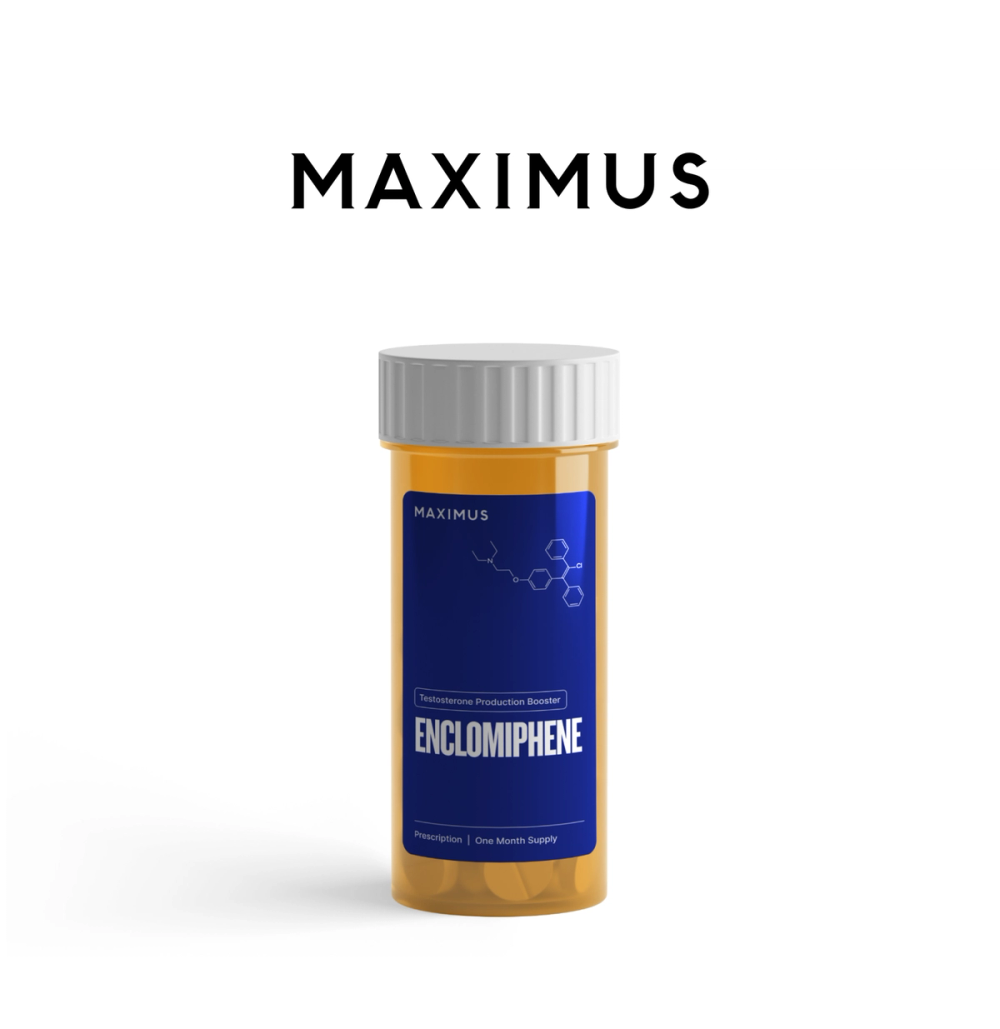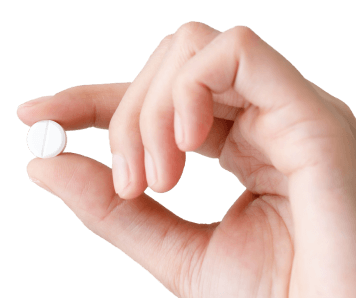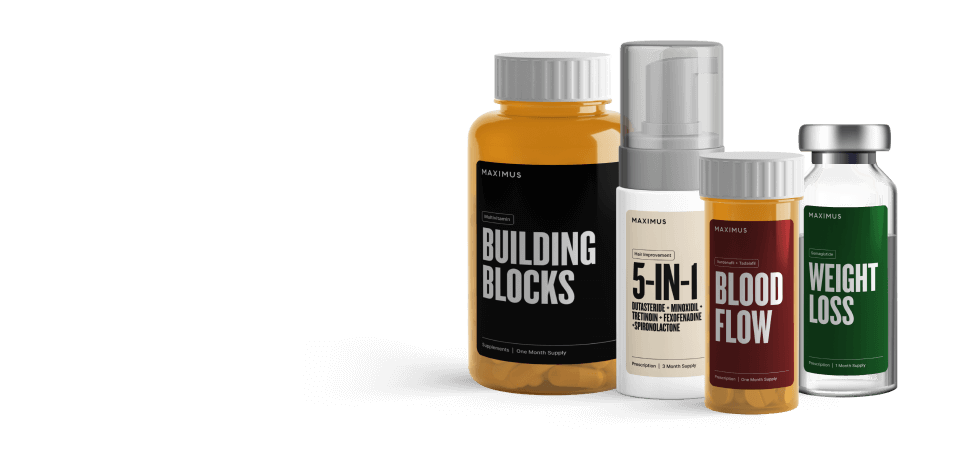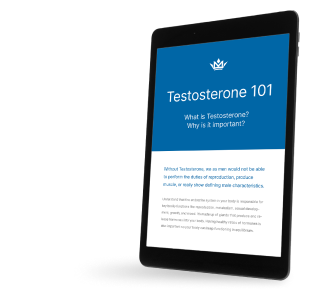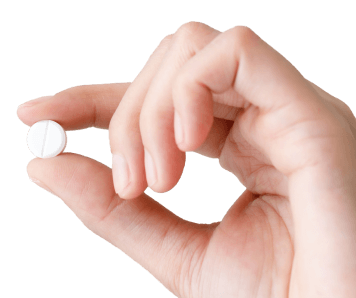Introduction
Both enclomiphene citrate and human chorionic gonadotropin (HCG) are common treatments for low testosterone. However, HCG is associated with a number of undesirable side effects, such as breast enlargement, nausea, and fatigue. This is likely due to HCG’s estrogen-boosting properties.
Enclomiphene is proving to be a suitable alternative to HCG because it effectively increases testosterone while blocking the feedback effects of estrogen on the brain and testicles. You also don’t have to inject it like HCG.
Read on to find out how enclomiphene achieves its testosterone-boosting effects, how it compares to HCG, and what you should know about combining the two medications.
Key takeaways:
- HCG and enclomiphene are effective alternatives to TRT; they can increase your testosterone levels without compromising your fertility.
- HCG is associated with a number of side effects due to its estrogen-boosting effects, such as gynecomastia and mood swings. Enclomiphene blocks estrogen and does not have these effects.
- Some individuals combine HCG and enclomiphene, but it isn’t necessary. However, the combination can be useful if you’re trying to recover your sperm count after being on TRT.
What is HCG?
HCG is produced by the placenta during pregnancy and appears in a pregnant woman’s blood and urine as early as 10 days after conception. Pregnancy tests measure HCG levels to determine if a woman is pregnant. Once the placenta starts producing HCG, it triggers the body to create more estrogen and progesterone.
What is HCG for men?
Men do not produce HCG naturally, but when it is injected into the body, it functions like a hormone that the male body does produce: luteinizing hormone (LH). These hormones target Leydig cells in the testes, stimulating them to produce and release testosterone.
Unlike testosterone replacement therapy (TRT), HCG stimulates testosterone production without compromising spermatogenesis. It has even been shown to improve semen parameters in patients who had been using exogenous testosterone. This is primarily why the American Urological Association has long recommended HCG therapy for men with testosterone deficiency who wish to maintain their fertility, along with selective estrogen receptor modulators (SERMs) and aromatase inhibitors (AIs).
Does HCG increase testosterone on its own?
Many men have been prescribed HCG in addition to TRT to reduce the side effects of exogenous testosterone and to prevent testicular atrophy. Some men also use HCG to help maintain their response to TRT by “cycling off” and replacing it with HCG periodically.
However, some studies have proven HCG to be an effective monotherapy for low testosterone. In this 2019 study, HCG was prescribed to 20 men struggling with symptoms of low testosterone like low libido, lack of energy, and erectile dysfunction. Over an average therapy duration of 6 months, mean testosterone improved by 49.9% from a baseline of 362 ng/dL to 519.8 ng/dL and 50% of patients reported symptom improvement with no reported side effects or complications.
HCG side effects
Though HCG is often used to reduce symptoms associated with TRT, it does come with reported side effects of its own. These are likely the result of HCG’s ability to increase estrogen in the body.
Side effects of HCG may include:
- Acne
- Mood swings
- Headaches
- Nausea
- Upset stomach
- Fatigue
- Pain and irritation at injections site
- Breast enlargement
- Weight gain
What is enclomiphene?
Enclomiphene citrate is the purified isomer of the medication Clomid® (clomiphene citrate). It belongs to a class of drugs known as selective estrogen receptor modulators (SERMs). These drugs bind to hypothalamic estrogen receptors in the brain, which tricks the body into thinking that it’s not getting enough estrogen. This stimulates the production of the hormones luteinizing hormone (LH) and follicle stimulating hormone (FSH) to boost testosterone production.
Unlike TRT, enclomiphene citrate does not shut down your body’s ability to make its own testosterone by replacing it with a synthetic version. Rather, it stimulates your body’s ability to make its own testosterone. And unlike HCG and Clomid (which contains zuclomiphene), enclomiphene does not increase estrogen in the body or produce side effects like mood swings or breast enlargement.
Does enclomiphene increase testosterone on its own?
There are no reported side effects of dual therapy with enclomiphene and exogenous testosterone, so some doctors do prescribe both to help decrease the side effects of TRT. However, there are numerous studies proving that enclomiphene increases testosterone levels as a monotherapy without raising estrogen levels.
In a study comparing enclomiphene to transdermal testosterone, researchers found that enclomiphene consistently increased total testosterone into the normal range while simultaneously increasing LH and FSH above the normal range. Transdermal testosterone, on the other hand, raised total testosterone but suppressed serum levels of LH and FSH.
And in this three-month study that compared enclomiphene citrate to topical testosterone, both testosterone treatments increased testosterone, but those taking topical testosterone experienced a significant decline in sperm concentration. This decline led to more than half of the study subjects becoming oligospermic.
Enclomiphene side effects
Enclomiphene has a strong safety profile testosterone and is generally well-tolerated without serious drug interactions. The most common side effects reported include:
- High libido
- Acne
- Aggression
Less commonly, the following side effects have been observed in less than 4% of users:
- Headache
- Nausea
- Diarrhea
- Dizziness
- Hot flush
- Joint pain
Enclomiphene vs HCG
Studies comparing HCG vs Clomid (which includes the isomer enclomiphene) has found that both treatments are equally effective in restoring testosterone levels without compromising fertility. When it comes to HCG and enclomiphene, there are some crucial differences to consider. They include:
- Method of delivery: HCG is an injectable medication, whereas enclomiphene is available in oral form. Because of its difference in form, HCG often requires refrigeration and mixing, which can be time-consuming.
- Side effects: Due to its estrogen-boosting effects, HCG may cause side effects like mood changes and breast enlargement in males, but these effects are not seen in enclomiphene due to its estrogen blocking effects. Keep in mind that Clomid, though equally as effective in restoring T levels, also boosts estrogen like HCG, contributing to similar side effects.
- Accessibility: Due to FDA compounding restrictions, HCG is now highly restricted, lowering its accessibility and potentially raising its cost for testosterone restoration. Though there were talks of enclomiphene being similarly restricted, as of 2023, this has not yet happened. Enclomiphene is not yet FDA approved, but it is still available for purchase whether you have low T or simply want to experience the benefits of optimized testosterone.
Can you use enclomiphene and HCG together?
It is possible to combine enclomiphene or other SERMs with HCG, although it may be unnecessary. This study looked at three groups–men taking HCG, men taking clomiphene citrate, and men taking a combination of therapies–and found that all three treatments were equally effective.
However, if you are trying to recover your sperm concentration after being on TRT, you may benefit from combining HCG and SERMs. Research shows that men on TRT with azoospermia or severe oligozoospermia have significantly improved their sperm count within an average of 4.7 months after discontinuing TRT when treated with HCG in combination with either AIs, SERMs like enclomiphene, or rFSH.
When deciding what method you should use to restore or optimize your testosterone levels, it’s imperative to assess your own unique health needs. Always consult your doctor before attempting to modify your T levels on your own. Find out how the Maximus Testosterone Protocol can help.
Disclaimer: The contents of this article, including, but not limited to, text, graphics, images, and other information, is for information purposes only and does not constitute medical advice. The information contained herein is not a substitute for and should never be relied upon for professional medical advice. The content is not meant to be complete or exhaustive or to be applicable to any specific individual's medical condition. You should consult a licensed healthcare professional before starting any health protocol and seek the advice of your physician or other medical professional if you have questions or concerns about a medical condition. Always talk to your doctor about the risks and benefits of any treatment. Never disregard or delay seeking professional medical advice or treatment because of something you have read on this site. Maximus does not recommend, endorse, or make any representation about the efficacy, appropriateness, or suitability of any specific test, products, procedures, treatments, services, opinions, healthcare providers or other information contained herein. Maximus is not responsible for, nor will they bear any liability for, the content provided herein or any actions or outcomes resulting from or related to its use.

